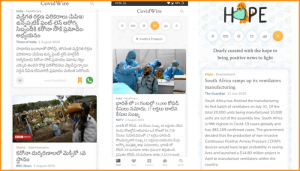When students joined hands to beat misinformation about the pandemic, CovidWire.in was born. Here’s how they’ve simplified information consumption even for non-native speakers of English.
When Raghavendra R, 68, read an online article of a study with a headline suggesting that being indoors and in your own homes was more fraught with risk of contracting Covid-19, he was understandably confused. As a cautious senior citizen, he had been following all governmental guidelines and avoiding unnecessary exposure outdoors. It was only after reading the entire piece that the actual story came to light: the study had found people were more likely to contract the coronavirus from (infected) members of their own households than from contacts outside the home.
Such instances of the general public being misled thanks to sensational news headlines have been on the rise due to the uncertain nature of the pandemic. It was to combat this as well as to provide a one-stop solution for authentic Covid-related news in an easily consumable format that 23-year-old Sarigama Yerra, from IIITH and her friend Poobesh Gautam from IDC, Mumbai teamed up to create a web application, CovidWire.in. “Despite being a research student myself who is used to reading through lengthy arcane articles, in the initial stages of the pandemic, I found myself getting overwhelmed by the influx of information,” admits Sarigama. It got her thinking about the problems faced by the common man and how guidelines issued by the World Health Organization (WHO) or the Centers for Disease Control and Prevention (CDC) were inaccessible to non-native speakers of the English language. When the two youngsters pitched the idea to their other friends scattered across the country, they found a willing army of volunteers who found resonance in such an initiative.
Neutral, Informative, and Concise
For the website, content from over 85 verified news sources is first curated and then simplified into comprehensible snippets of 70-100 words each. These handpicked articles are then automatically machine translated into 5 different languages – Hindi, Telugu, Tamil, Malayalam and Marathi. Mindful of the challenges and inaccuracies creeping in during automatic translation, news relevant to specific regions is then manually translated again by volunteers.
Exuding Positivity
The deluge in information on the pandemic has led to ‘corona fatigue’ among the general populace with even hardcore news buffs opting for a break from news on the virus. “After a while, it does seem like it’s the same news over and over again,” agrees Sarigama while adding that the CovidWire team’s aim is to look for uncommon and yet relevant stories. Despite the information overload, there is still uncertainty and lack of clarity on what the future has in store and for how long the social distancing measures will be in place. For the despondency that this has created, there is a special section on the website titled ‘Hope’ with a curated selection of positive news from across the globe. “The pandemic is super overwhelming and negative in general. This section is a dedicated space where people can read all the positive happenings from over the world at this point,” says Sarigama.

Integration With WhatsApp
‘Treatments’, purported scientific explanations and many other hoaxes saw a surge in circulation on platforms such as WhatsApp when authoritative information about the pandemic was still trickling in. Sensing an opportunity here, the youngsters have integrated a feature on their website where it is possible to share verified snippets of information to WhatsApp. “We wanted to inject something that is authentic into the WhatsApp ecosystem hoping that the ratio of fake news to authentic news changes slowly,” says Sarigama. Additionally, what is unique about this integration is that unlike typical forwards on WhatsApp which display only the link, here a share on WhatsApp reveals a short summary of the article along with the link to the complete article.
Finding Purpose
What originally started as an endeavour of a handful of students has steadily grown over 100+ strong with housewives, doctors, consultants and others in the mix now. “We have over 15 IIITH students itself and there are others from Delhi University, Jindal School of Law, and many other institutes. There’s a really solid design team with illustrators and UI folks from IDC,” says Sarigama. With the latest release accommodating some UI changes, the website also sports a brand-new section known as CovidWire Speak. It is essentially a space where their own community can write and publish original content. “There are researchers and data analysts who collect data from the govt using RTI and pen articles. Recently one of these articles got published on The Wire platform,” she says with a hint of pride.
With the sense of uncertainty continuing to loom large, these youngsters are finding purpose in this initiative. “When we contribute to something like this, we feel like we’re trying something from our end to sort this mess. And this feeling of community – that’s not only the most beautiful but also the strongest part of our enterprise right now,” signs off Sarigama on a positive note.


